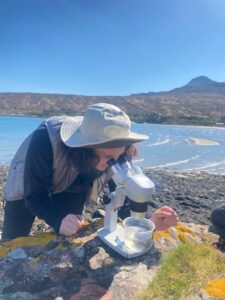This Must be the Place or Road to Nowhere?: Ontological Awareness in Outdoor Environmental and Sustainability Education Praxis
About the author

Hannah Granger completed the Outdoor, Environmental, and Sustainability Education MSc in 2023. As an educator in the United States, Dominican Republic and Colombia, she grew interested in teaching and learning spaces outside of the traditional classroom setting. As an avid traveler, documentary watcher, music lover, and voracious reader, her heroes are Sir David Attenborough, Dr. Jane Goodall, and David Whyte. Her professional aspiration is to continue educating in diverse learning settings to promote environmental citizenship, conservation, and systems thinking. If you have any questions, you can contact her at hanrosegra@gmail.com
Two people, simply by looking at the future in radically different ways have completely different futures awaiting them no matter their immediate course of action. Even the same course of action, coming from a different way of shaping the conversation will result in a different outcome. We are shaped by our shaping of the world and are shaped again in turn. The way we face the world alters the face we see in the world.
Excerpt From: Consolations: The Solace, Nourishment and Underlying Meaning of Everyday Words by David Whyte.
In June of 2022, I left my job as a classroom teacher, disillusioned by standardization and bureaucracy, for the greener pastures of Outdoor, Environmental, and Sustainability Education (OESE). However, upon making this choice, I struggled with exactly why I believed OESE settings were a more appealing teaching and learning environment than the traditional classroom. Was the OESE setting, ‘the place’ I had been searching for or was it a ‘road to nowhere’?
I quickly learned I was not alone in perceiving classroom settings as restrictive and, at times, destructive towards the world we inhabit. While pedagogical moves towards environmental citizenship and sustainability are being encouraged through a transdisciplinary and intersectional lens in some Western classrooms (Leite, 2021), there are places where it is being heavily censored or stamped out entirely in favor of more conservative ideals or for producing optimal standardized test results for funding (Jickling et. al, 2023).

“What becoming feels like to me”. Art by Jean-Pierre Weill from The Well of Being themarginalian.org/2015/02/26/the-well-of-being-jean-pierre-weill/
Alternatively, my fellow cohort members and I shared a common goal of seeking pedagogical approaches where learning transcends mere academic achievement and instead embraces becoming. The concept of becoming stems from post-humanist philosophy; namely from Deleuze & Guattari’s work. Education researcher Lisa A. Mazzei explains, “In Deleuze and Guattari’s ontology, all the things that have been understood as possessed by humans and products of their agency (e.g., ideas, language, speech, social relations) are entangled flows that are in a continual process of making and unmaking, of becoming,” (2013). To think of my experiences as a process of becoming was novel and challenged my notion of being in the world; as a human and as an educator. It challenged my perception of ‘before’ and ‘after’ learning, seeing and doing. As such, I was excited to see in what ways the OESE program could manifest becoming into praxis.
At the core of this process was ontological awareness. To be ontologically aware means to pay attention to how we perceive things relating to and interacting with each other (Bourke, 2017). To examine the ontological awareness of my becoming and its influence on my praxis, I used writing as inquiry methodology. I reflected upon two vignettes from my time in the OESE program, navigating the complexities of ontological awareness and its implications for my pedagogical decisions.
Through my inquiry, I was able to identify ontological disruptions (Jickling, 2014) within my experiences in the program that altered my ontological positioning (Zwicky, 2003). Ontological positioning refers to your current ontology – how you perceive the world. An ontological disruption or disturbance is an experience where your ontological positioning is altered. I questioned whether my investigation into ontological awareness made the disruptions more prominent and therefore had a greater impact on my ontological positioning. We know from research on place-based education that the learning environment, whether that be in the hills of the Scottish Highlands or a classroom in Medellín, Colombia, must be considered as it plays a significant role in the learning process. Therefore, is it appropriate to think that the way we perceive the world, our ontological positioning, could also need consideration in developing learning opportunities? By improving ontological awareness through encouraging learners to question, “Why do I think that way?” or “In what way does this fit or not fit how I already perceive the world?” we (facilitators) are guiding students to question their ontological positioning, leading to deeper critical and systems thinking.
I invite readers to reconsider the role of education, facilitator, learner, and environment in shaping our ontological frameworks and how it could be considered in creating more meaningful and engaging interactions with the world – human and more than human.
One key finding from my inquiry is the alignment between ontological disruptions and the pedagogical approaches that exist in OESE settings. Experiential learning, environmental citizenship, and place-based education emerge as powerful tools for fostering ontological awareness and facilitating transformative learning experiences. Therefore, OESE learning spaces that employ these frameworks and pedagogical moves, are primed for a next step in fostering ontological awareness in learners.
Finally, this inquiry allowed me to highlight the need for further research into the links between educational settings and the reinforcement of ontological awareness. I argue that while OESE settings provide fertile ground for ontological disruptions, there is potential for integrating such pedagogies into diverse educational contexts, including the traditional classroom setting.

Same excitement for ontological disruptions in a classroom at age 9 and in the fjords of Norway at age 30
References
Jickling, B., Morse, M., & Blenkinsop, S. (2023). Wild Pedagogies, Outdoor Education, and the Educational Imagination. In J. Činčera, D. Goldman, M. Medek, B. Johnson, & I. Alkaher (Eds.), Outdoor Environmental Education in the Contemporary World (pp. 183–198). Springer.
Leite, S. (2021). Using the SDGs for global citizenship education: definitions, challenges, and opportunities. Globalisation, Societies and Education, 20(3), 1–13. https://doi.org/10.1080/14767724.2021.1882957
Mazzei, L. A. (2013). A voice without organs: interviewing in posthumanist research. International Journal of Qualitative Studies in Education, 26(6), 732–740. https://doi.org/10.1080/09518398.2013.788761
Whyte, D. (2020). Consolations: the solace, nourishment and underlying meaning of everyday words. Many Rivers Press.
Zwicky, J. (2003). Wisdom & metaphor. Brush Education.




Comments are closed
Comments to this thread have been closed by the post author or by an administrator.